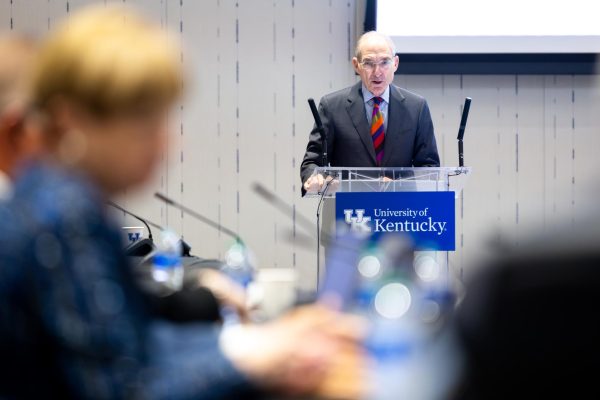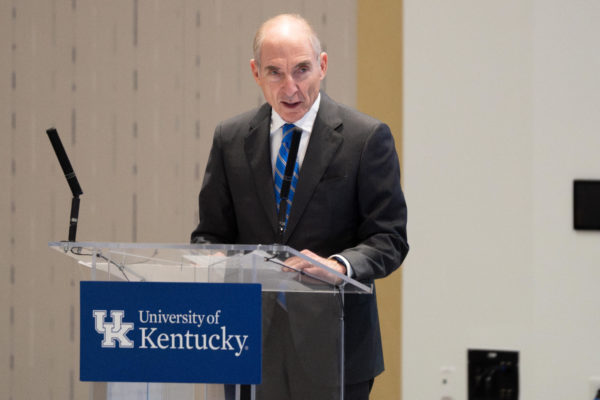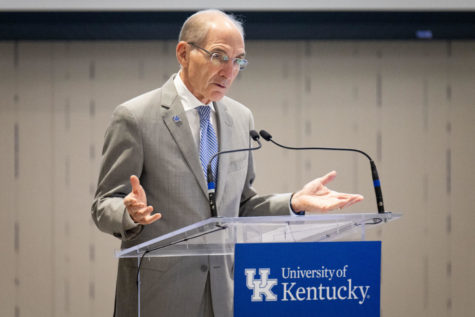Divest UK has fought against the repurposing of gas pipeline
Members of Divest UK are committed to stopping the repurposing of an infamous gas pipeline. | Photo provided by Divest UK.
October 31, 2018
After two years of fighting, ecological organizations, schools and civic bodies breathed a sigh of relief this month.
On Oct. 17, Kinder Morgan Energy Partners announced its intention to abandon the repurposing of a 75-year-old natural gas pipeline to carry natural gas liquids, byproducts of fracking that are used to produce plastics, solvents and refrigerants.
Divest UK is an on-campus student organization that started as a working group for UK’s Green Thumb and evolved this crusade into a commitment to support responsible and sustainable energy solutions.
The pipeline has had more than 100 “significant failures” in the past decade, causing damage to lives and property. It was thought to be too antiquated to handle the heavier and more incendiary byproducts, such as butane, propane and ethane.
In the case of a leak, these gases could collect in low-lying areas, causing serious fire hazards and potential health risks, as well as seep into the ground, contaminating soil and ground water.
Among those fighting the conversion of the pipeline with Divest UK were the Kentucky Student Environmental Coalition, Madison County, Eastern Kentucky University, Berea College and the Danville-Boyle County Economic Development Partnership.
Divest UK formed last spring semester. Its members’ goal is to convince the UK Board of Trustees investment committee to abandon all investment of the university’s endowment in fossil fuels as part of its policy.
The pipeline served not only as a symbol, but a symptom and catalyst of the expansion of the fossil fuel industry, which Divest UK members see as a serious threat to the health of the environment and the citizens of Kentucky.
“As the flagship institute of Kentucky, we have a responsibility to tackle the climate challenge head on. We also have the opportunity to become a leader in sustainability,” Divest UK Organizer Cameron Baller said.
The goal is not unprecedented. In May 2016, the University of Massachusetts became the first major public university to eliminate direct investment in fossil fuels, largely due to another student group, the UMass Fossil Fuel Divestment Campaign. Stanford University, the New York City pension fund and the entire country of Ireland are all examples of other successful divestitures.
Hedge funds that handle endowments like UK’s are diversified and it is often difficult to pinpoint exactly what industries are included in a fund from annual reports. Furthermore, the primary goal of an investment group is to maximize returns on the investment.
“Divesting from investments in any particular sector is not done lightly and we have done so rarely,” UMass Foundation Investment Committee Chair Edward H. D’Alelio said in a University of Massachusetts press release. “That we took this step reflects not just our comfort as fiduciaries, but the seriousness with which we see climate change.”
There is also evidence that divesting would not significantly change the profitability of the investment. Jeremy Grantham, founder of Grantham, Mayo and van Otterloo, a Boston-based fund manager, showed how over a 20-year period, eliminating one industry (such as energy) from an investment portfolio had little to no effect on return.
So far, Divest UK has had three meetings with UK administrators, and a fourth is planned for Nov. 2. The group has four clearly stated goals: “divestment from all major fossil fuel corporations,” “re-investment in climate-safe investments like clean energy with a focus on communities dependent on the fossil fuel industry,” “addition of social and environmental goals for managing all the endowment investments and transparency about posting of information about all investments on the university website in clear and accessible language.”
UK’s statement about the situation said that UK’s investment policy is broad and caused on global diversification “across a variety of asset classes and industries.”
“The student organization asked for– and received– time for a meeting and discussion with the Investment Committee of our Board of Trustees in May. Subsequent to the meeting, Board members expressed an interest for investment staff to continue their research and dialogue with the students on these issues,” the statement reads. “We are committed to doing so and in fact have been exchanging communications with student leaders about their interest in the transparency of endowment investments and how future investments might include funds focused on clean energy, items we have indicated a willingness and interest in discussing further.”
The statement said that additional discussion is being planned with administrators who managed UK’s endowment.
It was at the close of the last meeting that many group members found out that Kinder Morgan had abandoned the repurposing of the natural gas pipeline.
“Over the last few weeks, the university has been emphasizing the things ‘Kentucky Can’ do,” Baller said. “What Kentucky can do in this moment to protect the health and safety of current and future students is drive a more sustainable future.”



















































































































































